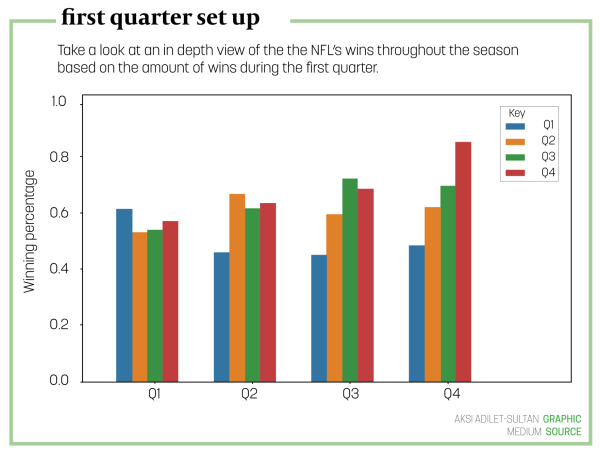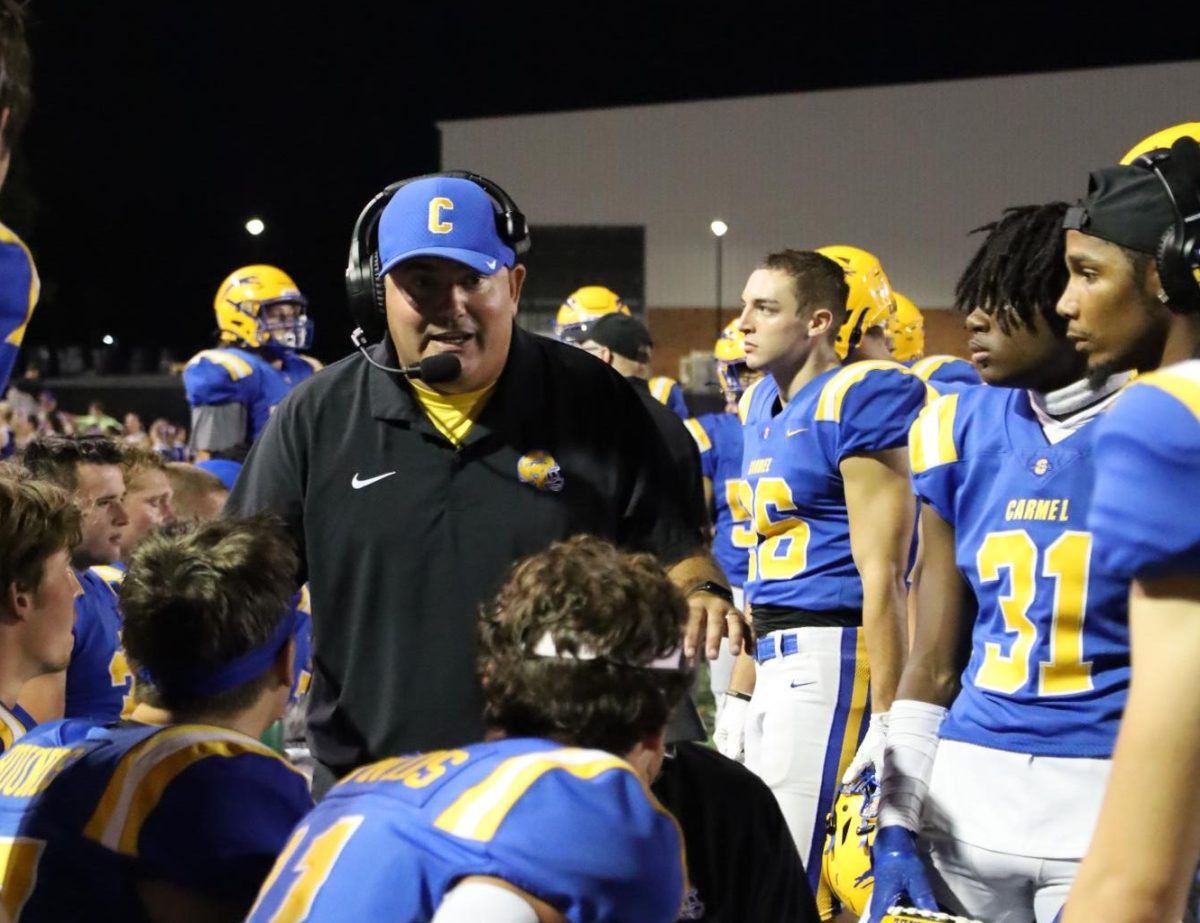For Anthony Coellner, junior and football player, football has always been a sport where he can learn and improve while connecting with his teammates. As the starting quarterback, Coellner has a large role in the team’s play, and he said his goal for the season is to help his team win.
“Win a State title, that’s definitely the goal,” Coellner said, “We’re all kind of saying it, the coaches are kind of saying it too.”
To get to that level, though, the team has to start somewhere. Coellner reflected on his first game of the season against Homestead, saying that even though the Greyhounds won that game, it doesn’t mean that team doesn’t still have a lot to work on.
Coellner said he found the first game has a different feel to it than other games throughout the season, even though he said the first game doesn’t have any more importance to it.
“I’d say the first game doesn’t shape the rest of your season,” Coellner said. “So even though we won, we still have a long way to go.”
Coellner’s opinion- that first games don’t necessarily impact the end-of-season results- may be correct. For example, according to the Milwaukee Journal Sentinel, in the past 30 years, eight football teams that lost the season opener went on to win the Super Bowl.
Still, Head Coach John Hebert said while the first football game is no more than a game to start the season, it is a little different from the rest. He said there is so much more preparation that goes into the first game, and lots of adjustments the team has to make.

“In the first game, you are susceptible to mistakes and not making the realization of how prepared each individual needs to be mentally,” Hebert said.
Hebert said after playing one game in the season, players can acclimatize to most of the different situations they might face during a game. Subsequent to the first game is when players can start to chart their improvement and growth.
Coellner said the first game is when you can see everything: practices and plays and team bonding come together.
“You’re definitely trying to see what your team really looks like, because you haven’t gone against a team all summer all spring,” Coellner said.
Drew Cannon, senior and football player, said he had a similar opinion as Coellner. He said he tries not to let outside factors determine how he plays, whether that be the first game or not. He said he doesn’t believe winning or losing the first game sets the scene for the succeeding games.
“I do not think the first game has an impact on how we play the whole season,” Cannon said. “We try to have the mentality that every week is a different football game and we can’t look back on things.”
A difference that Coellner, Cannon and Hebert said they have all found between the season opener and later games is the student section. The student section tends to show up for some games more than others, and the first game of the season is one with very high attendance. They said the student population can create an atmosphere that may change the way some players perform.
“The more people there are to support us, the more energy the players have and feel and more excitement,” Hebert said. “It’s definitely a big boost.”
Coellner said that going into the first game, he and his teammates are definitely more nervous, but they keep pushing forward.
“I would say the first game has more hype around it,” Coellner said, “But, it doesn’t define your season.”































![What happened to theater etiquette? [opinion]](https://hilite.org/wp-content/uploads/2025/04/Entertainment-Perspective-Cover-1200x471.jpg)













































![Review: “The Immortal Soul Salvage Yard:” A criminally underrated poetry collection [MUSE]](https://hilite.org/wp-content/uploads/2025/03/71cju6TvqmL._AC_UF10001000_QL80_.jpg)
![Review: "Dog Man" is Unapologetically Chaotic [MUSE]](https://hilite.org/wp-content/uploads/2025/03/dogman-1200x700.jpg)
![Review: "Ne Zha 2": The WeChat family reunion I didn’t know I needed [MUSE]](https://hilite.org/wp-content/uploads/2025/03/unnamed-4.png)
![Review in Print: Maripaz Villar brings a delightfully unique style to the world of WEBTOON [MUSE]](https://hilite.org/wp-content/uploads/2023/12/maripazcover-1200x960.jpg)
![Review: “The Sword of Kaigen” is a masterpiece [MUSE]](https://hilite.org/wp-content/uploads/2023/11/Screenshot-2023-11-26-201051.png)
![Review: Gateron Oil Kings, great linear switches, okay price [MUSE]](https://hilite.org/wp-content/uploads/2023/11/Screenshot-2023-11-26-200553.png)
![Review: “A Haunting in Venice” is a significant improvement from other Agatha Christie adaptations [MUSE]](https://hilite.org/wp-content/uploads/2023/11/e7ee2938a6d422669771bce6d8088521.jpg)
![Review: A Thanksgiving story from elementary school, still just as interesting [MUSE]](https://hilite.org/wp-content/uploads/2023/11/Screenshot-2023-11-26-195514-987x1200.png)
![Review: "When I Fly Towards You", cute, uplifting youth drama [MUSE]](https://hilite.org/wp-content/uploads/2023/09/When-I-Fly-Towards-You-Chinese-drama.png)
![Postcards from Muse: Hawaii Travel Diary [MUSE]](https://hilite.org/wp-content/uploads/2023/09/My-project-1-1200x1200.jpg)
![Review: "Ladybug & Cat Noir: The Movie," departure from original show [MUSE]](https://hilite.org/wp-content/uploads/2023/09/Ladybug__Cat_Noir_-_The_Movie_poster.jpg)
![Review in Print: "Hidden Love" is the cute, uplifting drama everyone needs [MUSE]](https://hilite.org/wp-content/uploads/2023/09/hiddenlovecover-e1693597208225-1030x1200.png)
![Review in Print: "Heartstopper" is the heartwarming queer romance we all need [MUSE]](https://hilite.org/wp-content/uploads/2023/08/museheartstoppercover-1200x654.png)



